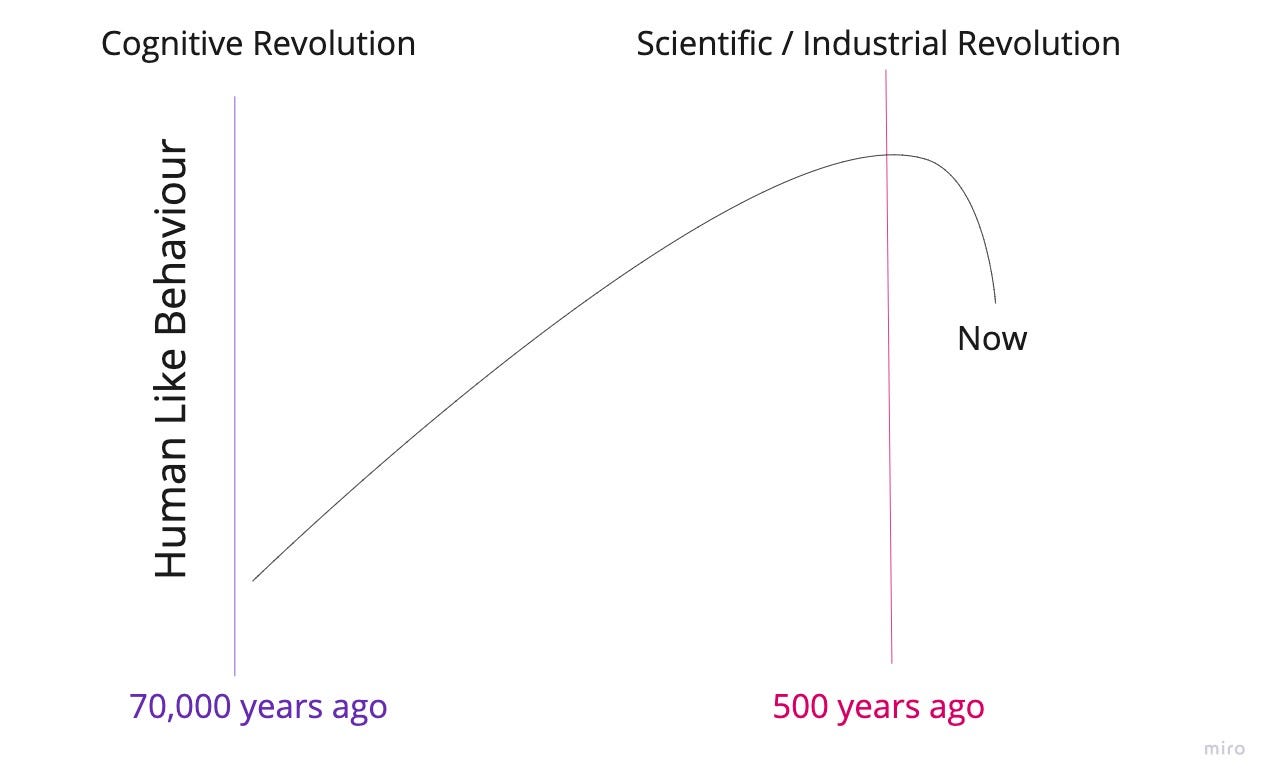In his popular and well researched book ‘Sapiens — A brief history of humankind’, Yuval Noah Harari, asserts that humans “can weave common myths such as the biblical creation story, the Dreamtime myths of Aboriginal Australians, and the nationalist myths of modern states. Such myths give Sapiens the unprecedented ability to cooperate flexibly in large numbers.” And “That’s why Sapiens rule the world”. In other words, it is our ability to think like humans that has differentiated us from other animals and has made us reach where we are today in our evolution. Cognitive Revolution, that happened around 70,000 years ago, is when we acquired this ability act as humans and moved in a different trajectory of evolution as compared to other animals.
However, since the advent of scientific and industrial era, about 500 years ago, the endeavour of social and economic growth has largely been to make humans work in a more predictable, outcome focused way. The ‘assembly line thought’ has required us to focus on the job at hand, keep doing it day in and day out and keep improving the productivity. In other words, increasingly humans have been expected to work more like machines, rather than like humans.
At the risk of oversimplifying, let me try and draw a small picture that highlights the above two stated assertions.

Being able to do the repetitive tasks well, has been and is the corner stone of our economic progress. Therefore one can safely assume that these are not going to go away. However, does that mean that we will continue this downward trajectory of being less and less humans?
Even in the hotly contested debate on whether AI is good for us and that whether by promoting AI, are we moving towards a situation where we would be ruled by machines one day, it is very clear that in the short run AI is going to take over more and more repetitive tasks that we do now days. Increasingly we are seeing even the jobs that one would intuitively think as lying in the sole domain of humans, are being done through AI. Writing articles and diagnosing diseases are things that are being increasingly done better and faster by AI based machines than by humans.
Given the extremely helpful use cases that AI is being put to, as is evident from above examples, it is unlikely that the growth of AI is going to stop anytime soon. Does that mean that the humans involved in these professions are going to made redundant? What will journalists and doctors do if AI is going to write articles and diagnose diseases?
Simple answer is that humans should do what they are supposed to do, i.e. be more human. A journalist should focus on spending more time understanding people and writing more people centric stories rather than quarterly earnings reports. Instead of writing the day by day description of a cricket match, a sports journalist should write about how the debutant felt as he walked on to the field donning his country colours for the first time. A doctor would rather spend time in understanding the psyche of her patients and their family members, rather than just writing prescriptions.
These are the things that we as humans have been ignoring in order to do more and be more productive. Remember that doctor who never smiled back at you, despite you desperately wanting someone to comfort you in that time of crisis.
In his book Deep Medicine: How Artificial Intelligence Can Make Healthcare Human Again, Dr Eric Topol asserts that the Physicians are overworked and overwhelmed and have become prone to making medical errors and misdiagnoses. He proposes that AI has the potential to free physicians from the logistical tasks that interfere with their ability to connect to patients.
With AI based machines taking care of our day to day repetitive machine like tasks, we have this massive opportunity to behave more like humans. In the evolution of homo-sapiens, this is the second time we have been presented with this chance to become humans. First time we grabbed it 70,000 years ago and it led to a phenomenal period of evolution. Can we do it again?
— — — — — — — — — — — — — — — — — — — — — — — — — — — — —
[1] https://blog.reputationx.com/can-bots-write-great-articles-yet#:~:text=A%20Swedish%20man%20named%20Sverker,into%20the%20act%20as%20well.
[2] https://www.economist.com/technology-quarterly/2020/06/11/the-potential-and-the-pitfalls-of-medical-ai